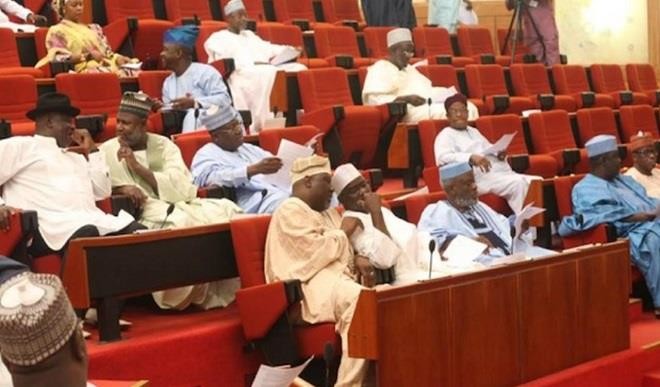Taking up the Senate on transparency
Recently, some 16 credible civil society organisations addressed the press in Abuja over an issue that has for long been of interest to almost every Nigerian: transparent running of the National Assembly and clear commitment from the law-making body on the fight against corruption. The press briefing itself followed submission of a petition on the […]


Recently, some 16 credible civil society organisations addressed the press in Abuja over an issue that has for long been of interest to almost every Nigerian: transparent running of the National Assembly and clear commitment from the law-making body on the fight against corruption. The press briefing itself followed submission of a petition on the subject to the office of the President of the Senate, Senator Bukola Saraki.
The press briefing anchored by the Comrade Olanrewaju Suraju of the Civil Society Network Against Corruption (CSNAC), touched on the six pro-accountability points on which the CSOs demand Senate’s immediate action. They are issues that Nigerians have for a long time been advocating, to see that the National Assembly, not only support present anticorruption effort but seen to have set example with itself.
Highpoint of the demands is opening up of the National Assembly budget to public scrutiny and demonstrating support for the current anticorruption effort of the federal government by resolving the conundrum around the confirmation of the EFCC acting chairman, Mr. Ibrahim Magu.
As an important arm in the triangular architecture of governance, the National Assembly has a huge responsibility. It is the arm of government responsible for making laws for the country, and following up to ensure compliance by other arms of government.
However, within the National Assembly, the Senate is the lead chamber responsible for many important decisions of the law-making body.
Transparency is key to operating an orderly and accountable system. It is an essential ingredient in the fight against corruption. It is for this reason that citizens in a democracy have a fundamental right to know and ask questions where necessary.
According to the CSOs, “Nigerians have been advocating for openness and accountability in the operations of government. It is commendable that the 8th National Assembly recently compelled such hitherto opaque agencies like FIRS, CBN and NNPC to subject their budgets to scrutiny. It is, therefore, important that the National Assembly follows the rule it has set for other agencies and institutions by making its own budget open for public scrutiny.”
The Senate has been accused of maintaining a bloated budget. Considering the prevailing economic situation in the country, the civil society and indeed all Nigerians demand of it an immediate review of its budget and spending, streamlining it in consonance with not only the present realities of the country but the everyday living conditions of majority of Nigerians.
Another important demand is on assets declaration. Nigerian leaders at all levels have developed some kind of thick skin to demands by citizens for them to openly declare their assets. The CSOs re-echo this issue by urging the Senate leadership to set the ball rolling by declaring their assets.
They also demand disclosure on pensions and gratuities received by former governors and deputy governors presently in the Red Chamber and receiving multiple housing and transportation allowances both as former state executives and serving senators.
One key issue from the coverage of the press briefing by the CSOs is the civil society position on the Magu matter. The respected civil society groups believe that one way the Senate would demonstrate goodwill in the fight against corruption, is the confirmation of the EFCC acting chairman. This would be a direct support for one of the cardinal objectives of the current government, which is the fight against corruption.
This is one particular issue that is at the heart of all well-meaning Nigerians. Magu, who was appointed by President Muhammadu Buhari in November 2015, has remained in acting capacity since then despite the president’s formal request for the upper legislative chamber to confirm his appointment.
In January, the president once again resubmitted the name after administrative findings rubbished the report upon which the Senate relied to reject Magu in December. The red chamber has however remained lethargic in acceding to the president’s request. This is inspite of Mr. Magu’s sterling achievements which have earned him nationwide accolades.
Many attribute the Senate’s lethargy to the fear of the unknown among some of them, especially those who already have skeletons in their cupboards. And, talking of skeletons, one of the six points in the petition to the Senate leadership is for the investigation of allegations around financial impropriety in renting purported official houses for presiding officers of the National Assembly.
The CSOs prayed, on this issue; “For the sake of probity and the integrity of the Senate, we urge an independent inquiry into the allegations. Such unattended accusations have the unsavoury effect of undermining the public standing of this important organ of governance.”
Through individual citizens and coalitions of civil society organisations, Nigerians have for a long time been expressing desire for a National Assembly that is responsive, responsible and fully accountable to the people whose interests the members ought to represent.
However, with all the entreaties, advocacies and agitations, according to the activists, “the Senate has failed to provide the needed leadership for a more accountable system both within the National Assembly and in the larger governance architecture.”
These issues, among others raised in the petition, are germane and require the support of all Nigerians to impress upon the Senate and indeed all organs of our leadership to be accountable to the people and take matters of transparency in governance more seriously.
Ahmed wrote from Fagge, Kano
